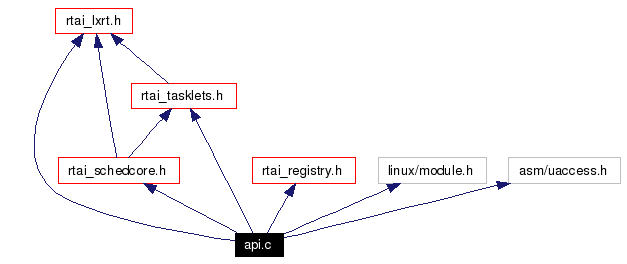
This program is distributed in the hope that it will be useful, but WITHOUT ANY WARRANTY; without even the implied warranty of MERCHANTABILITY or FITNESS FOR A PARTICULAR PURPOSE. See the GNU General Public License for more details.
You should have received a copy of the GNU General Public License along with this program; if not, write to the Free Software Foundation, Inc., 59 Temple Place - Suite 330, Boston, MA 02111-1307, USA.
Definition in file api.c.#include <rtai_schedcore.h>
#include <rtai_registry.h>
#include <linux/module.h>
#include <rtai_lxrt.h>
#include <rtai_tasklets.h>
#include <asm/uaccess.h>
Include dependency graph for api.c:

Go to the source code of this file.
Defines | |
| #define | HASHED_REGISTRY |
| #define | COLLISION_COUNT() do { col++; } while(0) |
| #define | NONAME (1UL) |
| #define | NOADR ((void *)1) |
| #define | PRIMES_TAB_GRANULARITY 100 |
| #define | hash_fun(m, n) ((m)%(n) + 1) |
Functions | |
| void | rt_set_sched_policy (RT_TASK *task, int policy, int rr_quantum_ns) |
| int | rt_get_prio (RT_TASK *task) |
| Check a task priority. | |
| int | rt_get_inher_prio (RT_TASK *task) |
| Check a task priority. | |
| int | rt_change_prio (RT_TASK *task, int priority) |
| Change a task priority. | |
| RT_TASK * | rt_whoami (void) |
| Get the task pointer of the current task. | |
| void | rt_task_yield (void) |
| Yield the current task. | |
| int | rt_task_suspend (RT_TASK *task) |
| rt_task_suspend suspends execution of the task task. | |
| int | rt_task_suspend_if (RT_TASK *task) |
| int | rt_task_suspend_until (RT_TASK *task, RTIME time) |
| int | rt_task_suspend_timed (RT_TASK *task, RTIME delay) |
| int | rt_task_resume (RT_TASK *task) |
| Resume a task. | |
| int | rt_get_task_state (RT_TASK *task) |
| Query task state. | |
| void | rt_linux_use_fpu (int use_fpu_flag) |
| Set indication of FPU usage. | |
| int | rt_task_use_fpu (RT_TASK *task, int use_fpu_flag) |
| int | rt_task_signal_handler (RT_TASK *task, void(*handler)(void)) |
| Set the signal handler of a task. | |
| void | rt_gettimeorig (RTIME time_orig[]) |
| int | rt_task_make_periodic_relative_ns (RT_TASK *task, RTIME start_delay, RTIME period) |
| Make a task run periodically. | |
| int | rt_task_make_periodic (RT_TASK *task, RTIME start_time, RTIME period) |
| Make a task run periodically. | |
| int | rt_task_wait_period (void) |
| Wait till next period. | |
| void | rt_task_set_resume_end_times (RTIME resume, RTIME end) |
| int | rt_set_resume_time (RT_TASK *task, RTIME new_resume_time) |
| int | rt_set_period (RT_TASK *task, RTIME new_period) |
| RTIME | next_period (void) |
| Get the time a periodic task will be resumed after calling rt_task_wait_period. | |
| void | rt_busy_sleep (int ns) |
| Delay/suspend execution for a while. | |
| int | rt_sleep (RTIME delay) |
| Delay/suspend execution for a while. | |
| int | rt_sleep_until (RTIME time) |
| Delay/suspend execution for a while. | |
| int | rt_task_masked_unblock (RT_TASK *task, unsigned long mask) |
| int | rt_nanosleep (struct timespec *rqtp, struct timespec *rmtp) |
| void | rt_enq_ready_edf_task (RT_TASK *ready_task) |
| void | rt_enq_ready_task (RT_TASK *ready_task) |
| int | rt_renq_ready_task (RT_TASK *ready_task, int priority) |
| void | rt_rem_ready_task (RT_TASK *task) |
| void | rt_rem_ready_current (RT_TASK *rt_current) |
| void | rt_enq_timed_task (RT_TASK *timed_task) |
| void | rt_wake_up_timed_tasks (int cpuid) |
| void | rt_rem_timed_task (RT_TASK *task) |
| void | rt_enqueue_blocked (RT_TASK *task, QUEUE *queue, int qtype) |
| void | rt_dequeue_blocked (RT_TASK *task) |
| int | rt_renq_current (RT_TASK *rt_current, int priority) |
| RT_TASK * | rt_named_task_init (const char *task_name, void(*thread)(long), long data, int stack_size, int prio, int uses_fpu, void(*signal)(void)) |
| RT_TASK * | rt_named_task_init_cpuid (const char *task_name, void(*thread)(long), long data, int stack_size, int prio, int uses_fpu, void(*signal)(void), unsigned int run_on_cpu) |
| int | rt_named_task_delete (RT_TASK *task) |
| int | hash_ins_adr (void *adr, struct rt_registry_entry *list, int lstlen, int nlink) |
| int | hash_ins_name (unsigned long name, void *adr, int type, struct task_struct *lnxtsk, struct rt_registry_entry *list, int lstlen, int inc) |
| void * | hash_find_name (unsigned long name, struct rt_registry_entry *list, long lstlen, int inc, int *slot) |
| unsigned long | hash_find_adr (void *adr, struct rt_registry_entry *list, long lstlen, int inc) |
| int | hash_rem_name (unsigned long name, struct rt_registry_entry *list, long lstlen, int dec) |
| int | hash_rem_adr (void *adr, struct rt_registry_entry *list, long lstlen, int dec) |
| int | registr (unsigned long name, void *adr, int type, struct task_struct *lnxtsk) |
| int | drg_on_name (unsigned long name) |
| int | drg_on_name_cnt (unsigned long name) |
| int | drg_on_adr (void *adr) |
| int | drg_on_adr_cnt (void *adr) |
| unsigned long | get_name (void *adr) |
| void * | get_adr (unsigned long name) |
| void * | get_adr_cnt (unsigned long name) |
| int | get_type (unsigned long name) |
| unsigned long | is_process_registered (struct task_struct *lnxtsk) |
| int | rt_get_registry_slot (int slot, struct rt_registry_entry *entry) |
| int | rt_registry_alloc (void) |
| void | rt_registry_free (void) |
| int | rt_register (unsigned long name, void *adr, int type, struct task_struct *t) |
| int | rt_drg_on_name (unsigned long name) |
| int | rt_drg_on_adr (void *adr) |
| unsigned long | rt_get_name (void *adr) |
| Get an object name by its address. | |
| void * | rt_get_adr (unsigned long name) |
| Get an object address by its name. | |
| int | rt_get_type (unsigned long name) |
| int | rt_drg_on_name_cnt (unsigned long name) |
| int | rt_drg_on_adr_cnt (void *adr) |
| void * | rt_get_adr_cnt (unsigned long name) |
| void | krtai_objects_release (void) |
| int | rt_irq_wait (unsigned irq) |
| int | rt_irq_wait_if (unsigned irq) |
| int | rt_irq_wait_until (unsigned irq, RTIME time) |
| int | rt_irq_wait_timed (unsigned irq, RTIME delay) |
| void | rt_irq_signal (unsigned irq) |
| int | rt_irq_task_handler (unsigned irq, RT_TASK *irq_task) |
| int | rt_request_irq_task (unsigned irq, void *handler, int type, int affine2task) |
| int | rt_release_irq_task (unsigned irq) |
| void | usp_request_rtc (int, void *) |
| RT_TASK * | rt_exec_linux_syscall (RT_TASK *rt_current, RT_TASK *task, struct pt_regs *regs) |
| RT_TASK * | rt_receive_linux_syscall (RT_TASK *task, struct pt_regs *regs) |
| void | rt_return_linux_syscall (RT_TASK *task, unsigned long retval) |
| EXPORT_SYMBOL (rt_set_sched_policy) | |
| EXPORT_SYMBOL (rt_get_prio) | |
| EXPORT_SYMBOL (rt_get_inher_prio) | |
| EXPORT_SYMBOL (rt_change_prio) | |
| EXPORT_SYMBOL (rt_whoami) | |
| EXPORT_SYMBOL (rt_task_yield) | |
| EXPORT_SYMBOL (rt_task_suspend) | |
| EXPORT_SYMBOL (rt_task_resume) | |
| EXPORT_SYMBOL (rt_get_task_state) | |
| EXPORT_SYMBOL (rt_linux_use_fpu) | |
| EXPORT_SYMBOL (rt_task_use_fpu) | |
| EXPORT_SYMBOL (rt_task_signal_handler) | |
| EXPORT_SYMBOL (rt_gettimeorig) | |
| EXPORT_SYMBOL (rt_task_make_periodic_relative_ns) | |
| EXPORT_SYMBOL (rt_task_wait_period) | |
| EXPORT_SYMBOL (rt_task_set_resume_end_times) | |
| EXPORT_SYMBOL (rt_set_resume_time) | |
| EXPORT_SYMBOL (rt_set_period) | |
| EXPORT_SYMBOL (next_period) | |
| EXPORT_SYMBOL (rt_busy_sleep) | |
| EXPORT_SYMBOL (rt_sleep) | |
| EXPORT_SYMBOL (rt_task_masked_unblock) | |
| EXPORT_SYMBOL (rt_nanosleep) | |
| EXPORT_SYMBOL (rt_enq_ready_edf_task) | |
| EXPORT_SYMBOL (rt_enq_ready_task) | |
| EXPORT_SYMBOL (rt_renq_ready_task) | |
| EXPORT_SYMBOL (rt_rem_ready_task) | |
| EXPORT_SYMBOL (rt_rem_ready_current) | |
| EXPORT_SYMBOL (rt_enq_timed_task) | |
| EXPORT_SYMBOL (rt_wake_up_timed_tasks) | |
| EXPORT_SYMBOL (rt_rem_timed_task) | |
| EXPORT_SYMBOL (rt_enqueue_blocked) | |
| EXPORT_SYMBOL (rt_dequeue_blocked) | |
| EXPORT_SYMBOL (rt_renq_current) | |
| EXPORT_SYMBOL (rt_named_task_init) | |
| EXPORT_SYMBOL (rt_named_task_delete) | |
| EXPORT_SYMBOL (is_process_registered) | |
| EXPORT_SYMBOL (rt_register) | |
| EXPORT_SYMBOL (rt_drg_on_name) | |
| EXPORT_SYMBOL (rt_drg_on_adr) | |
| EXPORT_SYMBOL (rt_get_name) | |
| EXPORT_SYMBOL (rt_get_adr) | |
| EXPORT_SYMBOL (rt_get_type) | |
| EXPORT_SYMBOL (rt_get_registry_slot) | |
| EXPORT_SYMBOL (rt_task_init) | |
| EXPORT_SYMBOL (rt_set_runnable_on_cpus) | |
| EXPORT_SYMBOL (rt_set_runnable_on_cpuid) | |
| EXPORT_SYMBOL (rt_check_current_stack) | |
| EXPORT_SYMBOL (rt_schedule) | |
| EXPORT_SYMBOL (rt_spv_RMS) | |
| EXPORT_SYMBOL (rt_sched_lock) | |
| EXPORT_SYMBOL (rt_sched_unlock) | |
| EXPORT_SYMBOL (rt_task_delete) | |
| EXPORT_SYMBOL (rt_is_hard_timer_running) | |
| EXPORT_SYMBOL (rt_set_oneshot_mode) | |
| EXPORT_SYMBOL (rt_get_timer_cpu) | |
| EXPORT_SYMBOL (start_rt_timer) | |
| EXPORT_SYMBOL (stop_rt_timer) | |
| EXPORT_SYMBOL (start_rt_apic_timers) | |
| EXPORT_SYMBOL (rt_sched_type) | |
| EXPORT_SYMBOL (rt_hard_timer_tick_count) | |
| EXPORT_SYMBOL (rt_set_task_trap_handler) | |
| EXPORT_SYMBOL (rt_get_time_cpuid) | |
| EXPORT_SYMBOL (rt_get_time_ns) | |
| EXPORT_SYMBOL (rt_get_cpu_time_ns) | |
| EXPORT_SYMBOL (rt_get_base_linux_task) | |
| EXPORT_SYMBOL (rt_alloc_dynamic_task) | |
| EXPORT_SYMBOL (rt_deregister_watchdog) | |
| EXPORT_SYMBOL (count2nano) | |
| EXPORT_SYMBOL (nano2count) | |
| EXPORT_SYMBOL (rt_kthread_init) | |
| EXPORT_SYMBOL (rt_smp_linux_task) | |
| EXPORT_SYMBOL (rt_smp_current) | |
| EXPORT_SYMBOL (rt_smp_time_h) | |
| EXPORT_SYMBOL (rt_smp_oneshot_timer) | |
| EXPORT_SYMBOL (wake_up_srq) | |
| EXPORT_SYMBOL (set_rt_fun_entries) | |
| EXPORT_SYMBOL (reset_rt_fun_entries) | |
| EXPORT_SYMBOL (set_rt_fun_ext_index) | |
| EXPORT_SYMBOL (reset_rt_fun_ext_index) | |
| EXPORT_SYMBOL (max_slots) | |
Variables | |
| int | max_slots |
| rt_registry_entry * | lxrt_list |
| spinlock_t | list_lock = SPIN_LOCK_UNLOCKED |
| unsigned long long | col |
| unsigned short | primes [] |
| rt_fun_entry | rt_fun_lxrt [] |
| struct { | |
| int(* handler )(unsigned irq, void *cookie) | |
| void * cookie | |
| int retmode | |
| int cpumask | |
| } | rtai_realtime_irq [] |
|
|
Definition at line 1053 of file api.c. Referenced by hash_find_adr(), hash_find_name(), hash_ins_adr(), hash_ins_name(), hash_rem_adr(), and hash_rem_name(). |
|
|
Definition at line 1069 of file api.c. Referenced by hash_find(), hash_find_adr(), hash_find_if_not_ins(), hash_find_name(), hash_ins(), hash_ins_adr(), hash_ins_name(), hash_rem(), hash_rem_adr(), and hash_rem_name(). |
|
|
|
Definition at line 1060 of file api.c. Referenced by hash_find_adr(), hash_ins_adr(), hash_rem_adr(), and hash_rem_name(). |
|
|
Definition at line 1059 of file api.c. Referenced by hash_find_name(), hash_ins_name(), hash_rem_adr(), hash_rem_name(), and rt_get_registry_slot(). |
|
|
Definition at line 1062 of file api.c. Referenced by rt_registry_alloc(). |
|
|
Definition at line 1301 of file api.c. References hash_rem_adr(), lxrt_list, and max_slots. Referenced by rt_drg_on_adr(). Here is the call graph for this function:  |
|
|
Definition at line 1306 of file api.c. References hash_rem_adr(), lxrt_list, and max_slots. Referenced by rt_drg_on_adr_cnt(). Here is the call graph for this function:  |
|
|
Definition at line 1291 of file api.c. References hash_rem_name(), lxrt_list, and max_slots. Referenced by rt_drg_on_name(). Here is the call graph for this function:  |
|
|
Definition at line 1296 of file api.c. References hash_rem_name(), lxrt_list, and max_slots. Referenced by rt_drg_on_name_cnt(). Here is the call graph for this function:  |
|
|
|
|
|
|
|
|
|
|
|
|
|
|
|
|
|
|
|
|
|
|
|
|
|
|
|
|
|
|
|
|
|
|
|
|
|
|
|
|
|
|
|
|
|
|
|
|
|
|
|
|
|
|
|
|
|
|
|
|
|
|
|
|
|
|
|
|
|
|
|
|
|
|
|
|
|
|
|
|
|
|
|
|
|
|
|
|
|
|
|
|
|
|
|
|
|
|
|
|
|
|
|
|
|
|
|
|
|
|
|
|
|
|
|
|
|
|
|
|
|
|
|
|
|
|
|
|
|
|
|
|
|
|
|
|
|
|
|
|
|
|
|
|
|
|
|
|
|
|
|
|
|
|
|
|
|
|
|
|
|
|
|
|
|
|
|
|
|
|
|
|
|
|
|
|
|
|
|
|
|
|
|
|
|
|
|
|
|
|
|
|
|
|
|
|
|
|
|
|
|
|
|
|
|
|
|
|
|
|
|
|
|
|
|
|
|
|
|
|
|
|
|
|
|
|
|
|
|
|
|
|
|
|
|
|
|
|
|
|
|
|
|
|
|
Definition at line 1329 of file api.c. References hash_find_name(), lxrt_list, and max_slots. Referenced by rt_get_adr(), and rt_register(). Here is the call graph for this function:  |
|
|
Definition at line 1334 of file api.c. References hash_find_name(), lxrt_list, and max_slots. Referenced by rt_get_adr_cnt(). Here is the call graph for this function:  |
|
|
Definition at line 1311 of file api.c. References flags, hash_find_adr(), list_lock, lxrt_list, max_slots, rt_spin_lock_irqsave(), and rt_spin_unlock_irqrestore. Referenced by rt_get_name(). Here is the call graph for this function:  |
|
|
Definition at line 1339 of file api.c. References hash_find_name(), lxrt_list, max_slots, and rt_registry_entry::type. Referenced by rt_get_type(). Here is the call graph for this function:  |
|
||||||||||||||||||||
|
Definition at line 1176 of file api.c. References rt_registry_entry::adr, COLLISION_COUNT, flags, hash_fun, list_lock, NOADR, rt_spin_lock_irqsave(), and rt_spin_unlock_irqrestore. Referenced by get_name(), and is_process_registered(). Here is the call graph for this function:  |
|
||||||||||||||||||||||||
|
Definition at line 1142 of file api.c. References COLLISION_COUNT, flags, hash_fun, list_lock, rt_registry_entry::name, NONAME, rt_spin_lock_irqsave(), and rt_spin_unlock_irqrestore. Referenced by get_adr(), get_adr_cnt(), and get_type(). Here is the call graph for this function:  |
|
||||||||||||||||||||
|
Definition at line 1071 of file api.c. References rt_registry_entry::adr, COLLISION_COUNT, flags, hash_fun, list_lock, NOADR, rt_spin_lock_irqsave(), and rt_spin_unlock_irqrestore. Referenced by hash_ins_name(). Here is the call graph for this function:  |
|
||||||||||||||||||||||||||||||||
|
Definition at line 1102 of file api.c. References COLLISION_COUNT, flags, hash_fun, hash_ins_adr(), list_lock, rt_registry_entry::name, NONAME, rt_spin_lock_irqsave(), and rt_spin_unlock_irqrestore. Referenced by registr(). Here is the call graph for this function:  |
|
||||||||||||||||||||
|
Definition at line 1247 of file api.c. References rt_registry_entry::adr, COLLISION_COUNT, rt_registry_entry::count, flags, hash_fun, list_lock, rt_registry_entry::nlink, NOADR, NONAME, rt_spin_lock_irqsave(), and rt_spin_unlock_irqrestore. Referenced by drg_on_adr(), and drg_on_adr_cnt(). Here is the call graph for this function:  |
|
||||||||||||||||||||
|
Definition at line 1207 of file api.c. References rt_registry_entry::alink, COLLISION_COUNT, rt_registry_entry::count, flags, hash_fun, list_lock, rt_registry_entry::name, NOADR, NONAME, rt_spin_lock_irqsave(), and rt_spin_unlock_irqrestore. Referenced by drg_on_name(), and drg_on_name_cnt(). Here is the call graph for this function:  |
|
|
Definition at line 1349 of file api.c. References hash_find_adr(), lxrt_list, max_slots, and TSKEXT0. Referenced by linux_process_termination(). Here is the call graph for this function:  |
|
|
Definition at line 1701 of file api.c. References rt_registry_entry::adr, IS_MBX, IS_PRX, IS_RWL, IS_SEM, IS_SPL, IS_TASK, max_slots, rt_registry_entry::name, NAMED_MBX_DELETE, NAMED_RWL_DELETE, NAMED_SEM_DELETE, NAMED_SPL_DELETE, num2nam(), PROXY_DETACH, rt_drg_on_adr(), rt_fun_lxrt, rt_get_registry_slot(), rt_named_task_delete(), rt_printk(), and rt_registry_entry::type. Referenced by __rtai_lxrt_exit(). Here is the call graph for this function: 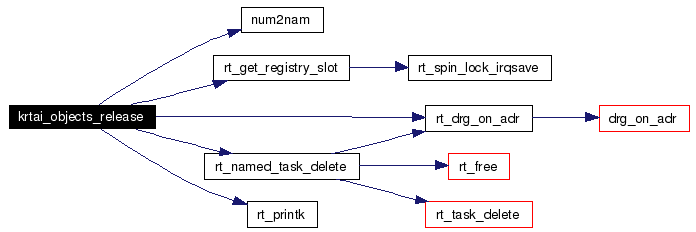 |
|
|
Get the time a periodic task will be resumed after calling rt_task_wait_period. this function returns the time when the caller task will run next. Combined with the appropriate rt_get_time function() it can be used for checking the fraction of period used or any period overrun.
|
|
||||||||||||||||||||
|
Definition at line 1286 of file api.c. References hash_ins_name(), lxrt_list, and max_slots. Referenced by rt_register(). Here is the call graph for this function:  |
|
|
Delay/suspend execution for a while. rt_busy_sleep delays the execution of the caller task without giving back the control to the scheduler. This function burns away CPU cycles in a busy wait loop so it should be used only for very short synchronization delays. On machine not having a TSC clock it can lead to many microseconds uncertain busy sleeps because of the need of reading the 8254 timer.
References llimd(), rtai_rdtsc, RTIME, and tuned. Referenced by __rtai_wd_exit(). Here is the call graph for this function:  |
|
||||||||||||
|
Change a task priority. rt_change_prio changes the base priority of task task to prio. Recall that a task has a base native priority, assigned at its birth or by rt_change_prio(), and an actual, inherited, priority. They can be different because of priority inheritance.
References flags, RT_SCHED_READY, RT_SCHED_SEMAPHORE, rt_schedule(), RT_TASK, SEM, and task. Here is the call graph for this function:  |
|
|
Definition at line 987 of file api.c. References dequeue_blocked(), RT_TASK, and task. Here is the call graph for this function:  |
|
|
Definition at line 1687 of file api.c. References drg_on_adr_cnt(). Referenced by rt_named_mbx_delete(), rt_named_msgq_delete(), rt_named_rwl_delete(), rt_named_sem_delete(), and rt_named_spl_delete(). Here is the call graph for this function:  |
|
|
Definition at line 1682 of file api.c. References drg_on_name_cnt(). Referenced by __rtai_shm_exit(), _rt_shm_free(), linux_process_termination(), and rt_named_hfree_typed(). Here is the call graph for this function:  |
|
|
Definition at line 938 of file api.c. References RT_TASK. |
|
|
Definition at line 943 of file api.c. References RT_TASK. |
|
|
Definition at line 963 of file api.c. References RT_TASK. |
|
||||||||||||||||
|
Definition at line 982 of file api.c. References enqueue_blocked(), RT_TASK, and task. Here is the call graph for this function:  |
|
||||||||||||||||
|
Definition at line 1830 of file api.c. References enqueue_blocked(), flags, RT_SCHED_READY, RT_SCHED_RECEIVE, RT_SCHED_RETURN, RT_SCHED_RPC, rt_schedule(), RT_TASK, and task. Referenced by lxrt_intercept_syscall_prologue(). Here is the call graph for this function:  |
|
|
Definition at line 1692 of file api.c. References get_adr_cnt(). Referenced by _rt_named_msgq_init(), _rt_named_rwl_init(), _rt_named_spl_init(), _rt_shm_alloc(), _rt_typed_named_mbx_init(), _rt_typed_named_sem_init(), rt_named_halloc_typed(), and rtai_shm_vm_open(). Here is the call graph for this function:  |
|
|
Check a task priority. rt_get_prio returns the base priority task task has inherited from other tasks, either blocked on resources owned by or waiting to pass a message to task task. Recall that a task has a base native priority, assigned at its birth or by rt_change_prio(), and an actual, inherited, priority. They can be different because of priority inheritance.
|
|
|
Check a task priority. rt_get_prio returns the base priority of task task. Recall that a task has a base native priority, assigned at its birth or by rt_change_prio(), and an actual, inherited, priority. They can be different because of priority inheritance.
|
|
||||||||||||
|
Definition at line 1355 of file api.c. References rt_registry_entry::adr, rt_registry_entry::alink, flags, list_lock, lxrt_list, rt_registry_entry::name, NONAME, rt_spin_lock_irqsave(), and rt_spin_unlock_irqrestore. Referenced by __rtai_shm_exit(), krtai_objects_release(), and linux_process_termination(). Here is the call graph for this function:  |
|
|
Query task state. rt_get_task_state returns the state of a real time task.
|
|
|
Definition at line 1677 of file api.c. References get_type(). Referenced by rt_set_heap(), rt_shm_alloc_usp(), rt_shm_size(), rtai_shm_f_ioctl(), rtai_shm_f_mmap(), and rtai_shm_vm_close(). Here is the call graph for this function:  |
|
|
Definition at line 543 of file api.c. References flags, llimd(), rtai_rdtsc, rtai_restore_flags, rtai_save_flags_and_cli, RTIME, and tuned. Referenced by handle_lxrt_request(). Here is the call graph for this function:  |
|
|
Definition at line 1782 of file api.c. References cookie, rt_task_resume(), and rtai_realtime_irq. Here is the call graph for this function:  |
|
||||||||||||
|
Definition at line 1789 of file api.c. References RT_TASK, and rt_task_resume(). Referenced by rt_request_irq_task(). Here is the call graph for this function:  |
|
|
Definition at line 1756 of file api.c. References RT_IRQ_TASK_ERR, rt_task_suspend(), and rtai_realtime_irq. Here is the call graph for this function:  |
|
|
Definition at line 1763 of file api.c. References RT_IRQ_TASK_ERR, rt_task_suspend_if(), and rtai_realtime_irq. Here is the call graph for this function:  |
|
||||||||||||
|
Definition at line 1777 of file api.c. References rt_irq_wait_until(), and RTIME. Here is the call graph for this function:  |
|
||||||||||||
|
Definition at line 1770 of file api.c. References RT_IRQ_TASK_ERR, rt_task_suspend_until(), rtai_realtime_irq, and RTIME. Referenced by rt_irq_wait_timed(). Here is the call graph for this function:  |
|
|
Set indication of FPU usage. rt_linux_use_fpu informs the scheduler that floating point arithmetic operations will be used also by foreground Linux processes, i.e. the Linux kernel itself (unlikely) and any of its processes.
References cpuid. |
|
|
Definition at line 1035 of file api.c. References rt_drg_on_adr(), rt_free(), RT_TASK, rt_task_delete(), and task. Referenced by krtai_objects_release(). Here is the call graph for this function: 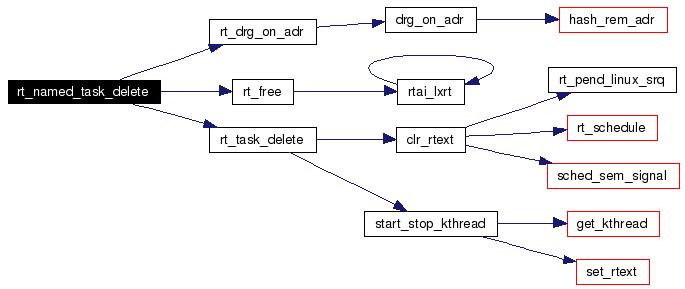 |
|
||||||||||||||||||||||||||||||||
|
Definition at line 999 of file api.c. References IS_TASK, nam2num(), rt_free(), rt_get_adr(), rt_malloc(), rt_register(), RT_TASK, rt_task_delete(), rt_task_init(), and task. Here is the call graph for this function: 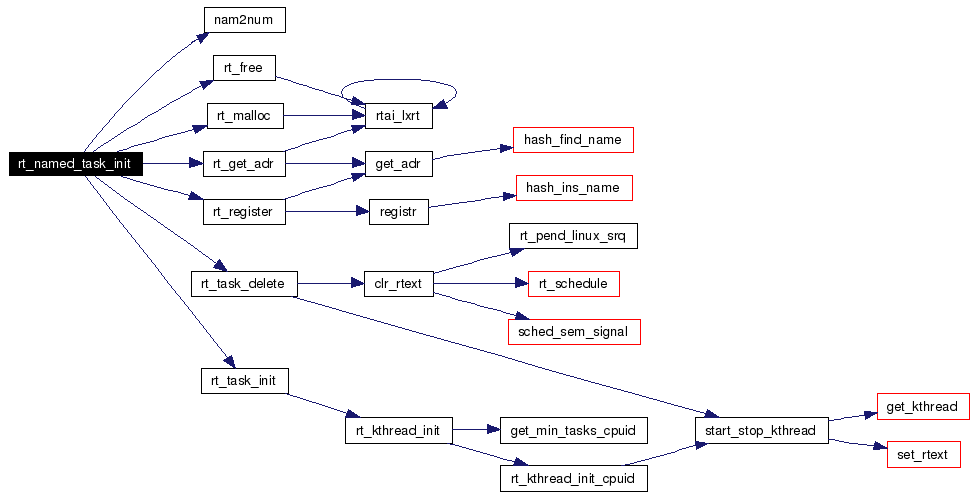 |
|
||||||||||||||||||||||||||||||||||||
|
Definition at line 1017 of file api.c. References IS_TASK, nam2num(), rt_free(), rt_get_adr(), rt_malloc(), rt_register(), RT_TASK, rt_task_delete(), rt_task_init_cpuid(), and task. Here is the call graph for this function: 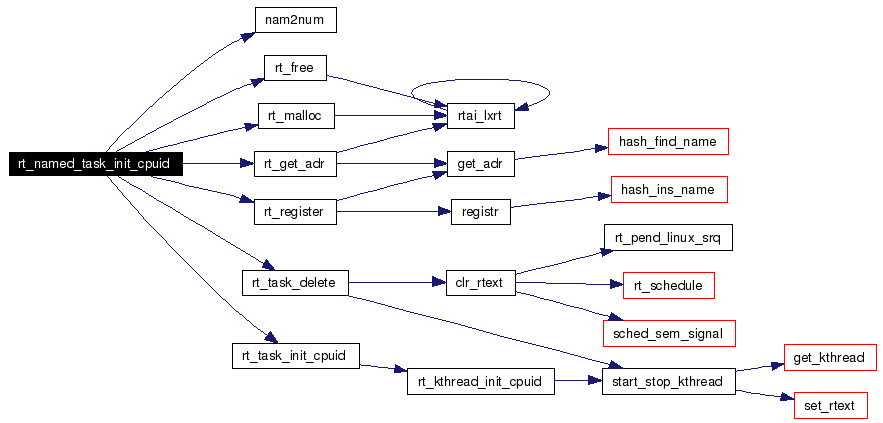 |
|
||||||||||||
|
Definition at line 919 of file api.c. References count2timespec(), rt_get_time(), rt_sleep_until(), RTIME, and timespec2count(). Here is the call graph for this function:  |
|
||||||||||||
|
Definition at line 1857 of file api.c. References dequeue_blocked(), enqueue_blocked(), flags, RT_SCHED_RECEIVE, RT_SCHED_RETURN, RT_SCHED_RPC, rt_schedule(), rt_smp_current, RT_TASK, and task. Referenced by linux_syscall_server_fun(). Here is the call graph for this function:  |
|
|
Definition at line 1369 of file api.c. References lxrt_list, max_slots, MAX_SLOTS, primes, PRIMES_TAB_GRANULARITY, and printk(). Referenced by __rtai_lxrt_init(). Here is the call graph for this function:  |
|
|
Definition at line 1384 of file api.c. References lxrt_list. Referenced by __rtai_lxrt_exit(), and __rtai_lxrt_init(). |
|
|
Definition at line 1809 of file api.c. References rt_release_irq(), rt_reset_irq_to_sym_mode(), RT_TASK, rt_task_resume(), rtai_realtime_irq, and task. Here is the call graph for this function:  |
|
|
Definition at line 958 of file api.c. References RT_TASK. |
|
|
|
||||||||||||
|
Definition at line 992 of file api.c. References RT_TASK. |
|
||||||||||||
|
Definition at line 948 of file api.c. References RT_TASK. |
|
||||||||||||||||||||
|
Definition at line 1795 of file api.c. References handler, rt_assign_irq_to_cpu(), rt_irq_task_handler(), RT_IRQ_TASKLET, rt_request_irq(), RT_TASK, and task. Here is the call graph for this function:  |
|
||||||||||||
|
Definition at line 1883 of file api.c. References dequeue_blocked(), flags, RT_SCHED_READY, RT_SCHED_RETURN, RT_TASK, and task. Referenced by linux_syscall_server_fun(). Here is the call graph for this function:  |
|
||||||||||||
|
Definition at line 757 of file api.c. References flags, RT_TASK, rtai_restore_flags, rtai_save_flags_and_cli, RTIME, and task. |
|
||||||||||||
|
Definition at line 736 of file api.c. References flags, RT_SCHED_DELAYED, RT_TASK, RTIME, and task. |
|
||||||||||||||||
|
Definition at line 34 of file api.c. References rt_times::linux_tick, nano2count_cpuid(), rt_smp_times, RT_TASK, and task. Here is the call graph for this function:  |
|
|
Delay/suspend execution for a while. rt_sleep suspends execution of the caller task for a time of delay internal count units. During this time the CPU is used by other tasks.
References flags, RT_SCHED_DELAYED, rt_schedule(), and RTIME. Referenced by RT_sleep(), and RT_sleep_until(). Here is the call graph for this function:  |
|
|
Delay/suspend execution for a while. rt_sleep_until is similar to rt_sleep() but the parameter time is the absolute time till the task have to be suspended. If the given time is already passed this call has no effect.
References flags, RT_SCHED_DELAYED, rt_schedule(), and RTIME. Referenced by nanosleep_rt(), rt_nanosleep(), and rt_timers_manager(). Here is the call graph for this function:  |
|
||||||||||||||||
|
Make a task run periodically. rt_task_make_periodic mark the task task, previously created with rt_task_init(), as suitable for a periodic execution, with period period, when rt_task_wait_period() is called. The time of first execution is defined through start_time or start_delay. start_time is an absolute value measured in clock ticks. start_delay is relative to the current time and measured in nanoseconds.
References flags, RT_SCHED_DELAYED, RT_SCHED_SUSPENDED, RT_TASK, RTIME, and task. Referenced by __rtai_wd_init(), main(), and user_srq(). |
|
||||||||||||||||
|
Make a task run periodically. rt_task_make_periodic_relative_ns mark the task task, previously created with rt_task_init(), as suitable for a periodic execution, with period period, when rt_task_wait_period() is called. The time of first execution is defined through start_time or start_delay. start_time is an absolute value measured in clock ticks. start_delay is relative to the current time and measured in nanoseconds.
References flags, nano2count_cpuid(), rt_get_time_cpuid(), RT_SCHED_DELAYED, RT_SCHED_SUSPENDED, RT_TASK, RTIME, and task. Here is the call graph for this function:  |
|
||||||||||||
|
Definition at line 886 of file api.c. References flags, RT_SCHED_DELAYED, RT_SCHED_READY, RT_SCHED_RETURN, RT_SCHED_RPC, RT_SCHED_SEMAPHORE, RT_SCHED_SEND, RT_TASK, SEM, and task. Referenced by __task_delete(), and rt_signal_wake_up(). |
|
|
Resume a task. rt_task_resume resumes execution of the task task previously suspended by rt_task_suspend(), or makes a newly created task ready to run, if it makes the task ready. Since no account is made for multiple suspend rt_task_resume unconditionally resumes any task it makes ready.
References flags, RT_SCHED_DELAYED, RT_SCHED_READY, RT_SCHED_SUSPENDED, RT_TASK, and task. Referenced by __rtai_netrpc_init(), __rtai_tasklets_init(), check_slipping_badtask(), handle_lxrt_request(), kthread_m(), lxrt_exit(), port_server_fun(), rt_irq_signal(), rt_irq_task_handler(), rt_release_irq_task(), rt_request_signal(), rt_request_signal_(), RT_task_resume(), rt_timers_manager(), rt_Trigger(), rt_trigger(), signal_suprt_fun(), smpproof_task_delete(), and smpproof_task_suspend(). |
|
||||||||||||
|
Definition at line 710 of file api.c. References flags, RT_SCHED_DELAYED, rt_schedule(), RT_TASK, and RTIME. Here is the call graph for this function:  |
|
||||||||||||
|
Set the signal handler of a task. rt_task_signal_handler installs, or changes, the signal function of a real time task.
|
|
|
rt_task_suspend suspends execution of the task task. It will not be executed until a call to rt_task_resume() or rt_task_make_periodic() is made. No account is made for multiple suspends, i.e. a multiply suspended task is made ready as soon as it is rt_task_resumed, thus immediately resuming its execution if it is the highest in priority.
References flags, RT_SCHED_SUSPENDED, rt_schedule(), RT_TASK, and task. Referenced by dummy(), get_kthread(), hard_stub_fun(), kthread_fun(), lxrt_handle_trap(), Proxy_Task(), proxy_task(), rt_irq_wait(), rt_request_signal(), rt_signal_helper(), RT_task_suspend(), smpproof_task_suspend(), spv(), and support_tasklet(). Here is the call graph for this function:  |
|
|
Definition at line 284 of file api.c. References flags, RT_TASK, and task. Referenced by rt_irq_wait_if(). |
|
||||||||||||
|
Definition at line 345 of file api.c. References RT_TASK, rt_task_suspend_until(), RTIME, and task. Here is the call graph for this function:  |
|
||||||||||||
|
Definition at line 303 of file api.c. References cpuid, flags, RT_SCHED_DELAYED, RT_SCHED_SUSPENDED, rt_schedule(), RT_TASK, RTIME, SEM_TIMOUT, and task. Referenced by rt_irq_wait_until(), and rt_task_suspend_timed(). Here is the call graph for this function:  |
|
||||||||||||
|
rt_task_use_fpu informs the scheduler that floating point arithmetic operations will be used by the real time task task.
Referenced by rt_tasklet_use_fpu(). |
|
|
Wait till next period. rt_task_wait_period suspends the execution of the currently running real time task until the next period is reached. The task must have been previously marked for a periodic execution by calling rt_task_make_periodic() or rt_task_make_periodic_relative_ns().
References cpuid, flags, RT_SCHED_DELAYED, rt_schedule(), rt_smp_times, rtai_rdtsc, and rt_times::tick_time. Here is the call graph for this function:  |
|
|
Yield the current task. rt_task_yield() stops the current task and takes it at the end of the list of ready tasks having its same priority. The scheduler makes the next ready task of the same priority active. Recall that RTAI schedulers allow only higher priority tasks to preempt the execution of lower priority ones. So equal priority tasks cannot preempt each other and rt_task_yield() should be used if a user needs a cooperative time slicing among equal priority tasks. The implementation of the related policy is wholly in the hand of the user. It is believed that time slicing is too much an overhead for the most demanding real time applications, so it is left up to you. Definition at line 215 of file api.c. References flags, rt_schedule(), RT_TASK, and task. Here is the call graph for this function:  |
|
|
Definition at line 968 of file api.c. References cpuid. |
|
|
Get the task pointer of the current task. Calling rt_whoami from a task can get a pointer to its own task structure.
References RT_TASK. Referenced by watchdog(). |
|
||||||||||||
|
Definition at line 1822 of file api.c. References handler, rt_irq_signal(), and rt_request_rtc(). Here is the call graph for this function:  |
|
|
|
|
|
|
|
|
Definition at line 1051 of file api.c. Referenced by get_name(), hash_find_adr(), hash_find_name(), hash_ins_adr(), hash_ins_name(), hash_rem_adr(), hash_rem_name(), and rt_get_registry_slot(). |
|
|
Definition at line 1050 of file api.c. Referenced by drg_on_adr(), drg_on_adr_cnt(), drg_on_name(), drg_on_name_cnt(), get_adr(), get_adr_cnt(), get_name(), get_type(), is_process_registered(), registr(), rt_get_registry_slot(), rt_registry_alloc(), and rt_registry_free(). |
|
|
Definition at line 1049 of file api.c. Referenced by __rtai_shm_exit(), drg_on_adr(), drg_on_adr_cnt(), drg_on_name(), drg_on_name_cnt(), get_adr(), get_adr_cnt(), get_name(), get_type(), is_process_registered(), krtai_objects_release(), linux_process_termination(), registr(), and rt_registry_alloc(). |
|
|
Initial value: Definition at line 1064 of file api.c. Referenced by rt_registry_alloc(). |
|
|
|
Definition at line 1541 of file sched.c. Referenced by __rtai_netrpc_init(), init_fun_ext(), krtai_objects_release(), lxrt_init(), reset_rt_fun_entries(), rt_get_lxrt_fun_entry(), and set_rt_fun_entries(). |
|
|
|
 1.3.8
1.3.8